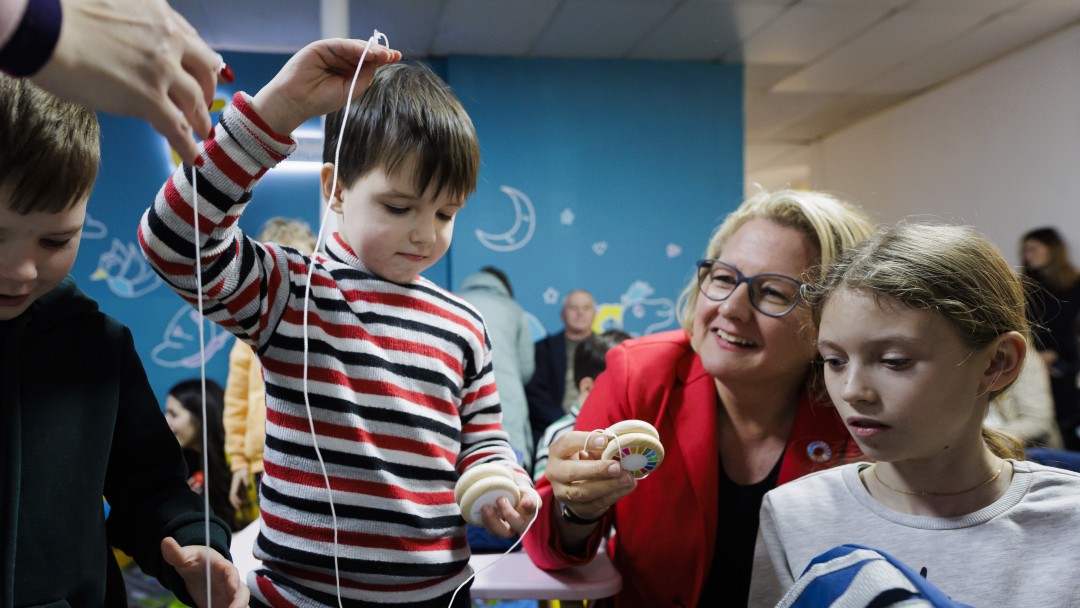News from 2023-02-02 / KfW Development Bank
Aid for Ukraine
Mitigating the consequences of the war
The Russian war of aggression has plunged Ukraine into a deep crisis. KfW is issuing grants and loans on behalf of the German Federal Government, for example to provide housing for displaced persons, pay teachers' salaries and secure supply of electricity and water. The Federal Ministry for Economic Cooperation and Development (BMZ) has also launched a support package for the Republic of Moldova to mitigate the regional consequences of the war.

No water, no electricity, bombed schools: the Russian war in Ukraine has massively affected the nation's infrastructure. In addition to the loss of human life and general hardship, this is placing a strain on the population's everyday lives. So far, 20% of people in Ukraine have suffered from poverty, and the World Bank expects this share to increase significantly.
Ukraine’s income has fallen sharply: tax revenues fell by 45% compared to pre-war years. At the same time, costs rose massively during the war. To ensure that state structures and the provision of services for the population can be maintained as well as possible, KfW is working on behalf of the Federal Ministry for Economic Cooperation and Development (BMZ) to help finance internally displaced persons, secure the existence of small businesses and finance the salaries of public officials. KfW is also commissioning the German Federal Foreign Office and the Federal Ministry for Economic Affairs and Climate Action (BMWK) to provide support programmes for Ukraine. Contracts totalling more than EUR 810 million were signed in 2022.
Maintaining education in schools
Together with the World Bank, KfW is financing the budget of municipalities with basket funding of EUR 50 million. This is used to pay salaries for teachers and administrative staff, making it possible to continue to issue birth certificates to citizens, disburse housing benefits and social assistance and continue school lessons – sometimes online.
The energy infrastructure has already been significantly destroyed. KfW is supporting maintenance of the energy supply for the population and will continue to provide financing for the repair, expansion and modernisation of the Ukrainian energy infrastructure in the future. At the end of 2022, a new loan agreement for EUR 32.5 million was signed on behalf of the BMZ with the Ukrainian electricity supplier Ukrenergo. KfW also contributed close to EUR 100 million to the Ukraine Energy Support Fund at the end of 2022 on behalf of the BMWK, which is used to finance short-term spare parts deliveries and technical equipment.
Providing for displaced persons
Around one third of the population has fled to find safety. Around 6 million have fled abroad, and a further 7 million have sought protection in other cities in Ukraine. To enable the Ukrainian state to support internally displaced persons, KfW is providing a grant of EUR 200 million on behalf of the BMZ. This makes it possible to make aid payments of around EUR 50 per person per month. KfW is providing a total of EUR 72.1 million for housing for internally displaced persons. For example, this will finance the conversion of public buildings into emergency accommodation, the repair of houses damaged by the war and the construction of new modular housing. Up to 2,000 apartments will be created in this way.
An estimated 1.4 million people in eastern Ukraine currently have no access to clean drinking water, while a further 4.6 million have only limited access. On behalf of the BMZ, KfW is providing UNICEF with a grant of EUR 35 million to help secure access to drinking water and sanitation, for example, and to enable families with children to have better access to protection and education.
Grants for electricity bills in the Republic of Moldova
The Republic of Moldova – one of the poorest countries in Europe – is also in a difficult situation. Energy prices have multiplied several-fold there since 2020. This is due to the accumulation of various crises: in addition to the war in neighbouring Ukraine, the dependence on Russian gas supplies, the COVID-19 pandemic and inflation of over 27% are also contributing to price increases. On behalf of the BMZ, KfW is also making a contribution to securing financing for the state budget for Moldova. A total of EUR 40 million will be spent on ensuring that poor people in particular can continue to afford heating.
A further EUR 11.5 million will be made available via UNICEF to supply children and young people and their families – in particular Ukrainian refugees – in the Republic of Moldova with water, sanitation and hygiene facilities. At the same time, their access to education and healthcare facilities will be eased. Around 176,000 people will benefit directly from these measures. The funds from BMZ come from the special initiative “Refugees and host countries”.

Share page
To share the content of this page with your network, click on one of the icons below.
Note on data protection: When you share content, your personal data is transferred to the selected network.
Data protection
Alternatively, you can also copy the short link: https://www.kfw-entwicklungsbank.de/s/enzBWrMC.C2yA
Copy link Link copied